The Second Thoughts of the Great(ish) Mountain King
Written by the Great and Beautiful Jynnian Figg, whose real name and place of lodging is none of your concern.

It all began one warm, summer day. The goblins were restless, he could tell that. What did they want? He’d given them everything they had asked for. All of their demands had been met. They had Shrip, and the army of dwarves that came with it. What more could they want? What more would they ask for?
He was approached by Kark, the prince of the goblins. He thought he was prepared for anything that they would ask. But he was not prepared for this.
They were to attack the Stronghold of the Faithful.
“Ithegaarde desires it for himself,” the goblin wheezed, squeezing his bulky frame into the king’s throne. “And he always gets what he wants.”
But the Stronghold of the Faithful? The dwarves were not allied with this place, this kingdom in the Northeastern portion of Central Theera, but they were not enemies. The dwarves lived in isolation in the Eastern Mountain Ranges, when they could.
Not anymore. Not since the goblins. The goblins had come up from under Mount Shrip and had attempted an attack. Of course, the attack had failed. Mount Shrip was the Stronghold of the Eastern Mountain Range. Nothing, and no one, could defeat them.
But the goblin prince was right. When Ithegaarde wanted something, he always found a way to get it. The goblins were powerless against Shrip, until Ithegaarde decided he would help them. The goblins had no strategy, no order, no capable leader.
Ithegaarde changed all of that. He joined with the goblins in the invasion. Instead of directly attacking the Stronghold, they began to attack the other, less defended mountains of the Range, gradually but steadily reaching Shrip. The campaign ended in a siege of mount Shrip. The king had had to make a difficult decision: stay underground and try to outlive the enemy, or surrender. For the sake of his soldiers, and the people living under his rule, he chose the latter, hoping that Ithegaarde would be merciful and spare their lives.
He had. But only, as the king now knew, because he had other purposes in his mind for them. He had willingly signed the alliance with Ithegaarde, unwittingly giving Ithegaarde full control over all the doings of Mount Shrip. The next day, the goblins had worked their way into the living quarters of the dwarves, and Mount Shrip had never been the same.
Now he sat there, the filthy goblin prince, with orders from Ithegaarde. Orders that the king was resolutely against following.
Of course, the dwarf king gave many reasons for his hesitance. If he didn’t, he would surely be punished.
Others had tried and failed to defeat The Stronghold, he said. The goblin countered this argument with the fact that the same was true about Shrip. When Kark uttered this, his facial expression caused the king to remain silent on this point.
He claimed that the Stronghold could not be defeated by sea or by land. The only entrance to the kingdom was a small, heavily guarded strip of land known as the Passage. The goblin prince calmly explained that they were not planning an attack. They were planning a siege. All they needed to do was simply outlive the Tanians, and attack when they were weak.
The king could no longer give any logical objections without having suspicion cast on his loyalty, and battle preparations began. Dwarves, elves, goblins, and a few humans hunted for provisions, gathered supplies, sharpened axes and swords. And all the while, the king looked on, supervising the tyranny.
He hated Ithegaarde, although he had never met him. As far as he knew, the man had never been in battle himself. He was always sending messengers. It was his way. Yet, from his throne in the middle of nowhere, from his city in the Waste, he was slowly conquering and ruling over all of Theera. This monster must be stopped. But how?
It had been a mistake to sign the treaty. It had been a mistake to allow these plans to continue. A mistake that, no matter how he tried, he could not find a single solution to.
But he could not sit by as preparations were made. He would not allow this movement. Tania, the Stronghold of the Faithful, had been free for as long as Theera had stood. They had earned their freedom, and worked hard for the power and the riches that they had. And now this monster would tear it down for his own pleasure. Ithegaarde didn’t need Tania. He wanted it. He wanted it for his own reasons.
The tyrant hated the Faithful and did everything in his power to destroy them. The king knew that now. He had seen enough in the defeat of Shrip alone to know that. What Ithegaarde had commanded the goblins to do to the Faithful in Shrip had been horrible. So horrible that those who boldly confessed to be Faithful had hidden, had pretended to change their loyalties.
Even him. The king, the Great King of the Mountain. He had submitted himself to Ithegaarde’s rule. He had betrayed the Ruler and all of the Faithful. It was the greatest, most irreparable crime he had ever committed against his people. But was there any way to correct the mistake? He knew he must live with the consequences of his actions, no matter what they were. But what would they possibly be?
Days passed, and he observed the preparations with much inner turmoil. He must take desperate action. And he must do it now.
And as the days passed, and as he watched, slowly but surely, a plan formed in his mind. A plan that would certainly not stop the invasion of the army, but would surely redeem him from his own mistakes.
The day of the march came. The army prepared to leave, led by their great kings, the goblin and the dwarf.
As they stood outside Mount Shrip, the dwarf king prepared to speak. The soldiers were anxious to hear what their king would tell them.
As the Great King of Many Mistakes looked towards his soldiers, fear gripped him, for he knew that these would most likely be his last words. They must be spoken, and they must be spoken by him.
“My people under the Great Mountain, and the allies which have lodged with us,” he began, and his voice freed itself in his throat.
“My people, I have done to you a great wrong.”
The expected surprise and concern was put forth.
“I have allowed darkness to reign within our midsts, and have caused darkness to dwell in you. Our enemies have caused us to deal foolishly. I have harmed all of you by allowing them to lodge with us. To eat at our table and bathe in our waters.”
Kark was angry. A flash of sunlight on metal, a hurried motion of the wrist. The king knew he had a matter of moments to give his final command, a command that was not controlled by the Tyrant, a command truly given by himself. He clutched at a blade hidden in his cloak and continued, rapidly and loudly.
“I have made a grave error, and I wish only to redeem myself.”
Kark began to run towards the king, openly brandishing a dagger.
“Tania must not fall! You must fight against the darkness, fight against the Tyrant!”
The dagger entered his side, just as he thrust forward with his own weapon. The dying dwarf king and the dying goblin prince glared into each other’s eyes, bleeding upon the dark, rough terrain.
But the dwarf had won. He had destroyed their plans. Not yet could the army leave for Tania. Messengers must be dispatched for Ithegaarde. New leaders must be found. More plans made. And maybe, just maybe, his words, his sacrifice would be enough to begin a Rebellion among the Faithful of Shrip. Tania, the Stronghold of the Faithful, was safe from attack, at least for a little while.
Three weeks later, a rider approached the Passage of Tania. He carried a message from the Great King of the Mountain. A message of warning.
You have probably read of the battle of Tania in your history books, my little children. But not enough tales have been told of the Great King of the Mountain. Or, as he may more rightly be called, the Greatish Mountain King. He was not great. He did nothing worthy of recognition. His most memorable deeds were the mistakes he was forced to rectify at the end of his life.
But he did not fully rectify them. He only redeemed himself from them, and prevented, at end of day, what would have been a massacre of innocents and theft of a sanctuary for the Faithful.
And that, my children, was enough.
The Ancient Book holds numerous stories of greatish people who followed a Great Ruler. The Faithful still exist. They still fight the darkness. And they still make mistakes. And often, they are remembered for those mistakes. But, as my story today shows, the greatest part of the Faithful are not their mistakes, but the One they are Faithful to, the One who forgives and loves. Remember then, the Faithful recorded in the Ancient Book, not for what they did wrong, but for how our Ruler used them in spite of the mistakes they made.
If you liked my story, please leave a heart! :) Thank you so much, and God bless!
More of my stories below!
About the Creator
Sarah Knopp
Hey! I’m a Christian, and first and foremost I love God and am thankful for his love for me!
I enjoy writing! I love telling stories to my little sisters, before bed and at a campfire, and then putting them on paper for others to enjoy!






Comments
There are no comments for this story
Be the first to respond and start the conversation.